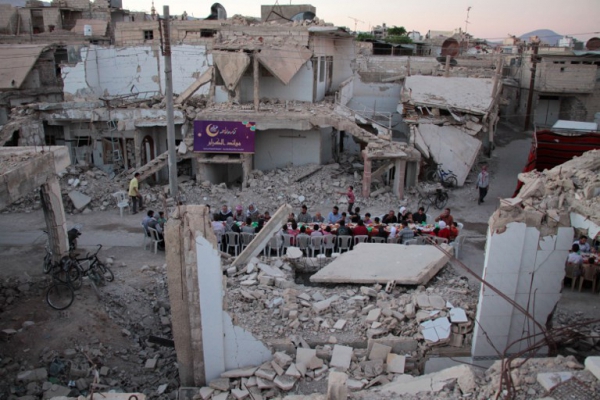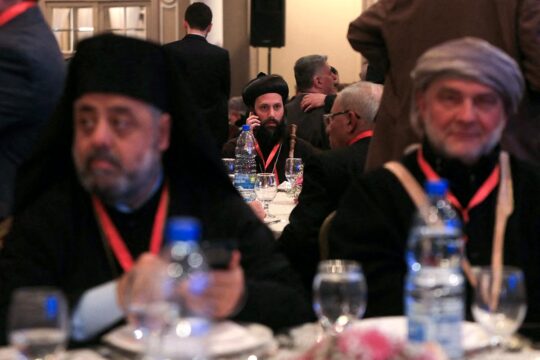An organization supporting Syrian civil society has launched a call for funding to support the International, Impartial and Independent Mechanism (IIIM) for Syria. This Mechanism, approved by the UN General Assembly in December 2016, is supposed to centralize evidence gathered over the last seven years of war and prepare potential war crimes cases for any future tribunal. The UN Secretary General is expected to announce shortly the name of the person to head this Mechanism, but its funding is still not certain.
Is justice for Syria too costly for UN Member States? The International, Impartial and Independent Mechanism (IIIM), approved by the UN General Assembly in December 2016, is to function with voluntary contributions from States. But since the Resolution was voted, contributions have been few and far between. This Mechanism, which is to centralize evidence gathered by NGOs, the Organisation for the Prohibition of Chemical Weapons and the Independent International Commission of Inquiry on Syria established by the UN Human Rights Council, does not for the moment have the resources to function fully. Its planned budget for the first two years is more than 12 million Euros. Up to now some 30 States have contributed about 8 million, which is not enough. So civil society members and organizations are now being asked… to dig into their own pockets! On June 19, the German-Syrian organization Adopt a revolution launched an online appeal with the provocative heading “Justice UNaffordable?”. “As the governments continue to hesitate, we will bring justice to Syria ourselves,” says the petition. The organizers hope to raise 1.9 million Euros by August 27. “Even if we do not achieve the target, each contribution sends a clear signal to the governments of UN member states,” says the petition. “They finally have to secure the funding for an independent UN-investigation in Syria.” As of June 20, 153 donors had already come forward with pledges equivalent to 14% of the target.
Apart from the money itself needed for the first two years, the Mechanism’s initiators are already hoping for a reform. They want it funded from the regular UN budget and not on the basis of voluntary contributions. They see this as a necessary guarantee for survival, since the ad hoc tribunals like in Sierra Leone struggled with this method of funding and were forced to knock incessantly on the doors of Member States to continue their work. Above all, it would be a guarantee of independence. Too much funding from countries involved in the war could politicize the mission, NGOs fear. Shortly after the Resolution was approved, numerous Syrian and international NGOs called for the contribution of each Member State to be limited to 10% of the overall budget. They were thinking particularly of Qatar, whose involvement in the Syrian conflict makes people uncomfortable. According to one human rights defender, Qatar, ally of Al Nosra which is one of the Jihadist groups in Syria, is trying to “win political points”. “Doha is paying for cut-price diplomacy,” comments one international justice expert. Getting the Mechanism included in the regular UN budget is all the more important since the December 2016 Resolution did not, unsurprisingly, meet with unanimous approval. Moscow and Teheran argued that the General Assembly did not have the legal power to create such a body. In the run-up to the January 2017 Astana negotiations between Damascus and part of opposition -- sponsored by Russia, Turkey and Iran --, Moscow denounced what it called “interference” in Syrian affairs that could “undermine prospects for peace”. Qatar and the Gulf States expressed enthusiastic support for the Mechanism, while Damascus said the Resolution was supported by “sponsors of terrorism”. Saudi Arabia responded by putting Hezbollah and the Syrian regime in the same basket. So the Mechanism’s founding Act was marked from the start by the dividing lines of the Syrian war. The issue of its budget, how it operates and who heads it are obviously no less sensitive. But whilst people in the UN were debating, many investigators were continuing the work they have been doing since the early years of the war. And bodies continued to pile up in Syria, a blood-soaked country where death has become commonplace.
Lots of evidence but no court
Christian Wenaweser, Liechtenstein’s ambassador to the UN who initiated this project, says that despite all the evidence gathered and the continuing horror on the ground, this Mechanism is “a first step in the right direction”. It is not perfect, he admits, because there is still no tribunal that has jurisdiction to try crimes committed in Syria. Since the war started in Syria in March 2011, all attempts to get international justice have failed. The first court that people looked to was the International Criminal Court (ICC), but it does not have jurisdiction since Syria has not ratified its founding treaty. Only the UN Security Council could therefore refer the Syria situation to the ICC, but in May 2014, Moscow vetoed a proposal to that effect by France. Since then, appeals to the ICC have been in vain. In February a group of Syrian intellectuals sent an open letter to the UN Secretary General demanding a referral to the ICC to “save the surviving detainees and publicly condemn all those responsible for crimes committed in Syrian prisons”. They based their demand on the “Caesar report”, which contains 55,000 photos testifying to 11,000 deaths in the prisons of the Syrian regime, photos smuggled out of the country by a forensic expert, and an Amnesty International report of 5,000 to 13,000 people killed in the Sadnaya prison near Damascus.
Sensing that Syria may never be referred to the ICC and hoping for a jurisdiction other than this Court whose track record is not brilliant, jurists started in 2012 to work on the creation of an ad hoc tribunal. Proposed Statutes have even been drawn up. They worked on the assumption that new authorities would rapidly take over in Syria. But the war has continued and spread. Given that there is no international jurisdiction, European prosecutors have since 2013 launched various procedures under the principle of “universal jurisdiction”, which allows trials of foreigners for international crimes committed on foreign soil. Germany, France, Sweden, the Netherlands, Switzerland and Spain have all launched cases, but there have not so far been any trials of those deemed most responsible.
Evidence
Thousands of pieces of evidence are nevertheless already available to any future prosecutor. Only a court is lacking. Since the beginning of the war, many human rights organizations have been gathering evidence and witness testimonies. The International Commission of Inquiry on Syria, established by the UN in 2011, has produced some 20 reports detailing crimes committed by the regime, the rebels and Jihadist groups. And a joint investigation by the UN and the Organisation for the Prohibition of Chemical Weapons (OPCW) is still under way. It is expected to name the perpetrators of nine chemical attacks in Syria. According to the four analyses to date, three chlorine gas attacks were carried out by the Syrian air-force and a mustard gas attack by Islamic State (IS). But for the moment the suspected perpetrators have not been named. Added to all this evidence is that of private organizations like the Commission for International Justice and Accountability (CIJA). Since 2012, Syrians have been gathering documents from the regime and smuggling them out at extreme risk to their lives. These include orders that could help trace the chain of command. CIJA, which works with international courts and experienced analysts, has already produced a document that could be the basis for an indictment against 24 members of the Syrian regime.
Ready prepared indictments
The Mechanism must now centralize, verify and analyse all these documents in order to draw up ready prepared case files. Given that there is no international court, much hope is being placed on universal jurisdiction and prosecutions in Europe. Once the Mechanism is in place, it will face numerous legal questions. A team is already working on them. How can witnesses be protected? On what basis should case files be drawn up? “In some judicial systems there is, for example the right to remain silent during questioning, whereas in others that is not a problem,” explains one jurist. And how can the source of evidence be traced? Many people raise questions also about pieces of evidence gathered during the war by the regime. Are they the property of the Syrian State? In a press conference in mid-May, OPCW Director-General Ahmet Uzumcu spoke of the difficulties of sharing documents provided by governments. Nothing can be done without their agreement, on a case by case basis. The founding Acts of the Mechanism already propose some answers. The evidence it collects will be classed as confidential and it can only be shared with democratic regimes that have already launched judicial procedures and which do not have the death penalty. There is no lack of evidence on crimes committed in Syria, and prosecutors are ready. And, even if there is not yet any tribunal for Syria, Bashar Al-Assad has already honed his defence strategy. In an interview published by the Sana agency on January 7, the Syrian President said that he must “defend our country by all possible means, and when we need to defend it by all means we are not concerned by this Court or any international institution”. He also said that the “UN institutions are not impartial, they are biased mainly because of the US, French and British influence”. Others before him have used the same arguments before international courts. Judges replied that they had the right to defend, but only within the rules of war. Not by using any means, not against civilians, and not at the cost of 300,000 lives.






